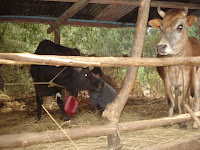SAP PROGRAMME IN PUNAKHA HIGHER SECONDRY SCHOOL

BY LEKI WANGMO AND NEELAM RAI, 12 Science A, 2010.
S
|
AP-school agriculture program has been instituted in almost all the schools and Punakha higher secondary school is no exception. It was initiated and reinstated as part of club activity in the year 2007 under the guidance of Mr. Bal Krishna Dungyel and the principal Mr.Kinley Gyeltshen.
Today, this club stands as one of the most successful clubs with 30 members and two co-coordinators along with SAP committee members.“Students learn by doing. They learn to respect dignity of labour and also value community service,” is what Mr.Sonam Gyeltshen, the club coordinator has to say. “LEARNING BY DOING,” thus stands their motto with the vision, to realize the concept of GNH through educational process by imparting values of dignity of labour, in mitigating rural to urban migration of youth and thus ushering balance development in the country.
The SAP area includes a small demo garden for the members to learn how to grow a variety of crop. The SAP covers the school agriculture house gardens, and horticulture too.
The school has a dairy farm surrounded by the fodder cultivation. There is a cowshed with two milking cows and two small calves. Am Prasad of class x along with his friends milks the cows twice a day. The milk is sold to the teachers and the staff. The milk makes revenue about 6000-7000 in a month.
The SAP club members work every Wednesday and Saturday and other days of the week subjected to the needs and demands of the work. And each of them has different experiences to share joining the club. “I learnt many values, can share common interest with friends and I learnt mushroom cultivation,” is what Sonam Penjor, (XC) has to say. There are other students like Yangchen, Amrita, and their friends who are very happy working there learning to value the dignity of labour and gain knowledge on cultivation of variety of crops. Nicholas Rai, a class 10 student wants to work hard to achieve the medal as the best RNR student.
The SAP committee members plays a bigger role in creating awareness and providing opportunities in Agriculture, plan the house agriculture activities as per the SAP action plan. They assist house parents in providing technical and other necessary support like seeds, manure and the methods of plantation and growing crops. The organic method of growing crops is practiced. The EM compost and vermin compost are the top priority.
As a recognition and motivation, the SAP committee award medals to the best RNR students and certificates to all the members. The awards are from The Council for RNR Research of Bhutan under the Ministry of Agriculture. It also awards prizes in the form of cash as incentives to the houses based on their performance.
SAP has plans to start Bio-gas plant. The proposal has been already submitted to the Ministry of Education and the club is waiting for the approval. Once the proposal is accepted, it would spell success for the club as well as the school. The bio-gas produced can be utilized in the School Kitchen, which can cut down the expenditure incurred in the usage of Electric rice-cookers and firewood, and thus help the school achieve one of the pillars of GNH i.e. ‘Preservation and conservation of nature.’ The club has also plans to start a Green House for raising early nurseries to meet the requirements of house gardens.
The club has already started with Shiitake Mushroom Cultivation and Straw Mushroom Cultivation on trial basis to provide education on Mushroom cultivation. The straw Mushroom is already a success.
The SAP started in schools in Bhutan in July 2000 as a joint venture between Ministry of Education and Ministry of Agriculture with the sole objective to provide basic agricultural education and provide a platform to practice the improved methods of modern farming in an integrated approach( organic way of vegetable growing and livestock) to produce green fresh vegetables to supplement nutritional values of boarding students and to gain awareness of self employment opportunities in the RNR sector in the near future. Thus the SAP in the Punakha higher secondary school provides the forum for the younger generation to consider farming as a viable occupation.


This article was actually meant for the school newsletter but due to some reasons the newsletter was not possible. I hope it will be enjoyed here.
ReplyDeleteNice one sir.. but i think images need a little bit of re-sizing..
ReplyDeleteI'll get some more images.
ReplyDelete